News
VS Code and Visual Studio Rock the 2022 Stack Overflow Developer Report
Stack Overflow's huge developer survey is out for 2022, showing that Visual Studio Code and Visual Studio have cemented their positions as the two most popular IDEs among more than 70,000 developers who were polled.
That's the same ranking they had in the 2018 survey and the 2019 survey and the 2021 survey (the 2020 survey inexplicably didn't include IDEs). Note that SO deems VS Code to be an IDE, though many rather classify it as a code editor.
However, while the rankings are the same, the percentage of respondents favoring Microsoft's two IDEs has actually increased. In 2018, 34.9 percent of respondents voted for VS Code, and 34.3 percent for Visual Studio. In 2019, those numbers were 50.7 percent and 31.5, respectively. In 2021, they were 71.06 percent and 33.03 percent. In 2022, they are 74.48 percent and 32.15 percent (so Visual Studio actually dipped a bit).
 [Click on image for larger view.] Top IDEs in 2022 (source: Stack Overflow).
[Click on image for larger view.] Top IDEs in 2022 (source: Stack Overflow).
Microsoft also fared well in many other categories.
For example, .NET was the top non-web framework/library, used by 34.55 percent of respondents, followed by NumPy (28.65 percent) and Pandas (25.08 percent). Interestingly, the order was NumPy, Pandas and .NET among those who were learning to code. As can be seen in the graphic below, SO this year used All Respondents, Professional Developers and Learning to Code segmentations.
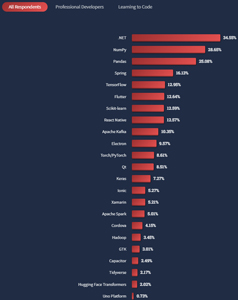 [Click on image for larger view.] Top Non-Web Frameworks/Libraries in 2022 (source: Stack Overflow).
[Click on image for larger view.] Top Non-Web Frameworks/Libraries in 2022 (source: Stack Overflow).
It's difficult to compare this result to prior years, as SO has changed things up from year to year, sometimes providing both .NET and .NET Core options in the same survey, while last year there was a combined .NET Core/.NET 5 choice. This year it's just .NET.
As far as web frameworks and technologies, SO provided both ASP.NET Core and just plain old ASP.NET options. The former came in at No. 7 (18.59 percent), immediately followed by ASP.NET (14.9 percent) at No. 8. A meaningless side note: If those two percentages were combined, they would come in at 33.49 percent, placing ASP.NET Core/ASP.NET in the No. 3 spot behind Node.js (47.12 percent) and React.js (42.62 percent).
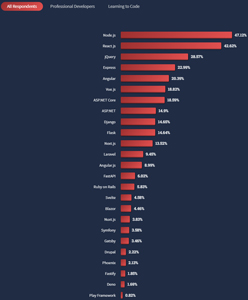 [Click on image for larger view.] Top Web Frameworks/Technologies in 2022 (source: Stack Overflow).
[Click on image for larger view.] Top Web Frameworks/Technologies in 2022 (source: Stack Overflow).
Meanwhile, Microsoft's programming languages, TypeScript and C#, came in at No. 5 and No. 8, respectively. Last year they were seventh and eighth, so TypeScript rose a couple steps. PowerShell (12th) and VBA (21st) also made the rankings.
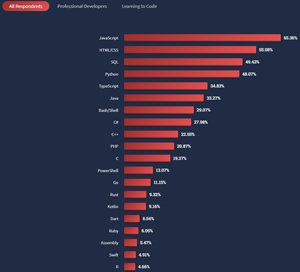 [Click on image for larger view.] Top 20 Programming, Scripting, and Markup Languages in 2022 (source: Stack Overflow).
[Click on image for larger view.] Top 20 Programming, Scripting, and Markup Languages in 2022 (source: Stack Overflow).
TypeScript was also the fourth "most loved" programming language, with C# coming in at No. 10, both falling a bit from last year.
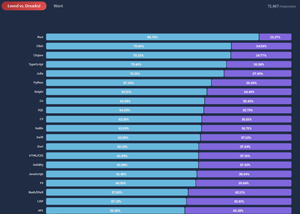 [Click on image for larger view.] Top 20 Programming, Scripting, and Markup Languages in 2022 (source: Stack Overflow).
[Click on image for larger view.] Top 20 Programming, Scripting, and Markup Languages in 2022 (source: Stack Overflow).
In the most wanted category, TypeScript was third and C# was ninth (SO describes this segmentation as percent of developers who are not developing with the language or technology but have expressed interest in developing with it).
As far as top-paying languages, F# ($95,526) was far ahead of its Microsoft brethren, placing third overall behind Clojure ($106,644) and Erlang ($103,000). PowerShell paid $78,084, while TypeScript paid $70,276, just ahead of C# at $69,516, and VBA paid $62,328.
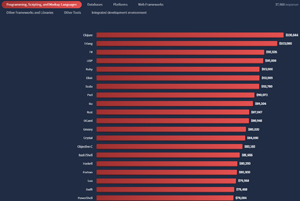 [Click on image for larger view.] Top 20 Highest Paying Programming, Scripting, and Markup Languages in 2022 (source: Stack Overflow).
[Click on image for larger view.] Top 20 Highest Paying Programming, Scripting, and Markup Languages in 2022 (source: Stack Overflow).
"The big draws with the Developer Survey have always been the technology rankings, where technologists profess their most used, loved, dreaded, and wanted languages, frameworks, and more," SO said in a blog post about the survey. "The top five languages for professional developers haven't changed: JavaScript is still the most used, and Rust is the most loved for a seventh year. The big surprise came in the most loved web framework category. Showing how fast web technologies change, newcomer Phoenix took the most loved spot from Svelte, itself a new entry last year."
Other highlights of the report as presented by SO include:
- Learning to code online increased from 60 percent to 70 percent year over year. Respondents older than 45 years are most likely to have learned from books, while younger ones are learning online. Younger (under 18) respondents rely most on online resources and are most likely to have learned from online courses or certifications.
- Last year we saw Git as a fundamental tool to being a developer. This year it appears that Docker is becoming a similar fundamental tool for Professional Developers, increasing from 55 percent to 69 percent. People learning to code are more likely to be using 3D tools than Professional Developers - Unity 3D (23 percent vs 8 percent) and Unreal Engine (9 percent vs 3 percent) - teaching themselves skills for 3D VR and AR.
- Rust is on its seventh year as the most loved language with 87 percent of developers saying they want to continue using it. Rust also ties with Python as the most wanted technology with TypeScript running a close second.
- Phoenix overtakes Svelte's spot as the most loved web framework. Angular.js is in its third year as the most dreaded. React.js completes its fifth year as most wanted.
- Docker and Kubernetes are in first and second place as the most loved and wanted tools. The desire to start using Docker does not appear to be slowing down as Docker increased from 30 percent last to 37 percent this year for wanted.
- Clojure remains the highest-paid language to know. Chef developers are the highest paid but Chef is also the most dreaded other tool. Big-data and data streaming skills are well compensated with Apache Spark, Apache Kafka, and Hadoop all in the top three other frameworks and libraries. Additionally, developers that have colocation experience are paid more than their cloud-only counterparts.
- Full-time employment went up by 4 percentage points for all respondents. Professional Developers that are "Independent contractor, freelancer, or self-employed" have grown significantly in the last year (up by 5 percentage points). In 2022 this question was changed to multi-select.
- 85 percent of developers say their organizations are at least partially remote. Smaller organizations are most likely to be in-person, with 20 percent of 2-19 employee organizations in-person. The largest organizations, with 10k+ employees, are most likely to be hybrid.
- 62 percent of all respondents spend more than 30 minutes a day searching for answers or solutions to problems. 25 percent spending more than an hour each day. Regardless of being an independent contributor or people manager, this is time that could be spent learning or building. For a team of 50 developers, the amount of time spent searching for answers/solutions adds up to between 333-651 hours of time lost per week across the entire team.
The SO report is based on a survey of 73,268 software developers from 180 countries around the world that was fielded from May 11 to June 1 this year. Full methodology can be seen toward the bottom of the report, which is available here.
About the Author
David Ramel is an editor and writer at Converge 360.